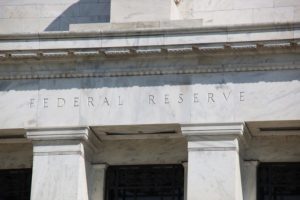Documents to Remain Open in Examiner’s Lawsuit Against Fed
A federal judge rejected the Federal Reserve Bank of New York's plea to seal documents in a wrongful termination lawsuit filed by a former bank examiner who claims she was fired for doing her job.By Jake Bernstein, ProPublicaThis story originally ran on ProPublica.
A federal judge rejected the Federal Reserve Bank of New York’s plea to seal documents in a wrongful termination lawsuit filed by a former bank examiner who claims she was fired for doing her job.
U.S. District Judge Ronnie Abrams ruled today in the case by Carmen Segarra against the New York Fed and three employees. Much of the material the Fed hoped to keep off limits, including 67 paragraphs from Segarra’s complaint and multiple exhibits, can be found on ProPublica’s website and others.
“I am not convinced that anything will be accomplished to seal or redact a complaint that is publicly available,” said Abrams in the hearing held at the federal courthouse in lower Manhattan.
Segarra worked for the New York Fed for seven months before being fired in May of last year. She was assigned to examine Goldman Sachs and its conflict-of-interest policies, she said. Segarra said she determined that Goldman’s policies did not meet Fed requirements. Her lawsuit alleges that her bosses tried to convince her otherwise and that she was fired after refusing to change her findings.
Goldman says it has robust methods for managing conflicts of interest and has declined comment on Segarra.
At today’s hearing, New York Fed attorney David Gross accused Segarra of stealing confidential documents, including her own internal emails and meeting minutes. Were the court to allow them to remain public on its own electronic records system, called Pacer, it “would be helping this improper conduct,” Gross said.
Gross compared the New York Fed’s relationship with the financial institutions it supervises to attorney-client privilege. Should the institutions lose faith in the Fed’s ability to keep communications and documents secret, it could spell trouble, he said.
“If [the supervised banks] don’t think it will be confidential, they will be less willing to give that information, to the detriment of the financial system,” said Gross.
Although ruling against the Fed, Abrams asked Segarra and her attorney, Linda Stengle, not to reveal any more confidential supervisory information without first consulting with her. “This is not a gag order,” the judge said. “I am not telling plaintiff she cannot talk about her case.”
Linda Stengle said afterward she was pleased about the ruling but unhappy that there were constraints placed on her client. “It’s important that the public have access to the information” in support of Segarra’s case, she said.
A spokesperson for the New York Fed did not immediately respond to a request for comment.
Your support matters…Independent journalism is under threat and overshadowed by heavily funded mainstream media.
You can help level the playing field. Become a member.
Your tax-deductible contribution keeps us digging beneath the headlines to give you thought-provoking, investigative reporting and analysis that unearths what's really happening- without compromise.
Give today to support our courageous, independent journalists.






You need to be a supporter to comment.
There are currently no responses to this article.
Be the first to respond.